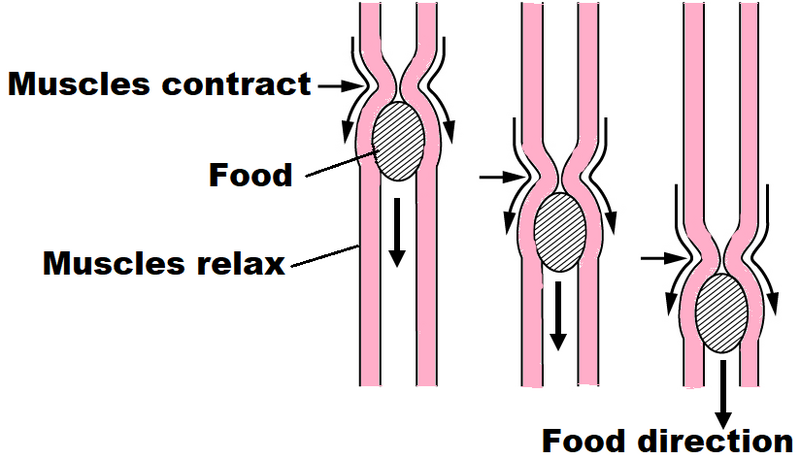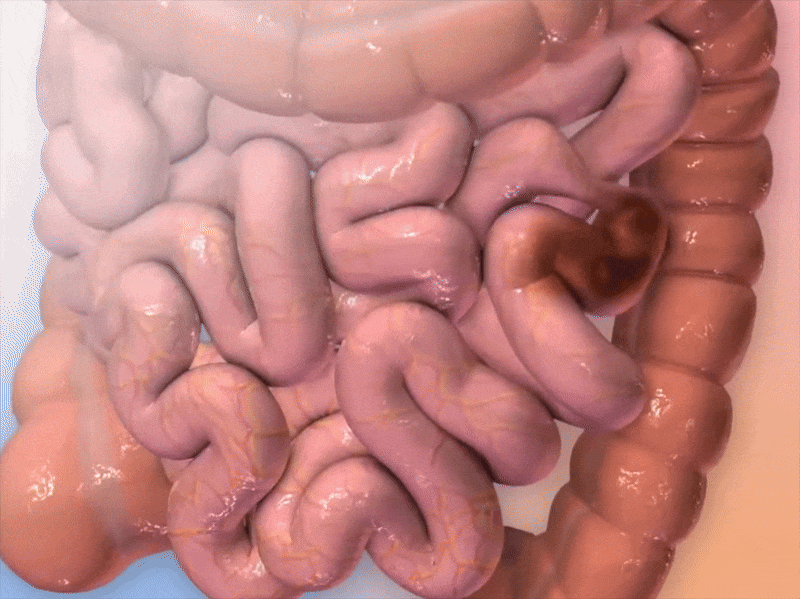Why does your stomach growl?
The short answer
Stomach growling is caused by muscle contractions that move food, liquid, and gas through your digestive system. These sounds are amplified when your stomach is empty but also occur during digestion after a meal.
The long answer
Is it thunder? A dog growling? No, wait, it's your stomach rumbling. To understand why you're able to create such sounds, let's first cover the basics of digestion.
How does food get digested?
Inside your body is a 30 ft (~9.14 m) long, winding tube that extracts nutrients and water from the food you eat. This is your digestive system.
"Digestive organs that can be affected by eosinophilic disorders" by NIAID is licensed under CC BY 2.0.
Here's a basic overview of the digestion process. (Note: I'm only covering the organs shown in the above diagram, as they relate most to the explanation of your rumbling tummy. Other organs, like the liver, pancreas, gallbladder, etc., are also involved in the complex process of digestion.)
Chewing and swallowing: First, each bite of food gets chewed in your mouth with saliva and then travels down your esophagus into the stomach.
Stomach churning: Once in your stomach, the food gets broken down further with the help of acid, enzymes, and a churning motion.
Small intestine nutrient absorption: The food is passed to your small intestine, which uses more enzymes to absorb nutrients into your body.
Large intestine water absorption and release: The waste product goes to your large intestine/colon, which absorbs water until it finally exits through your rectum.
One critical component of your digestive system is the movement of food, sometimes going up against gravity. A series of contractions known as peristalsis is responsible for passing the food baton from your esophagus all the way to your rectum.
Peristalsis is essentially a wave-like motion that moves churned-up food, which contains solids, liquids, and gases. Your stomach also uses peristalsis to break down food and mix it with the acids and enzymes, contracting muscles about every 20 seconds.
"2404 PeristalsisN- annotated" by OpenStax College is licensed under CC BY-SA 3.0.
These muscle contractions are the reason you occasionally hear a rumbling sound from your tummy. All of this squeezing and squishing of partially digested food echoes through the hollow tube of your digestive tract, amplifying the rumbling sounds.
In short, the sounds from your rumbling stomach (and intestines) are the acoustics of a working digestion system.
"Guidem michelin 1900" is part of the public domain.
Does stomach growling mean you're hungry?
The sounds you hear from your stomach and intestines can happen both when you're digesting food and when you're hungry. Having food in your system can muffle the sounds, which may be why we mainly notice them when we're hungry.
When your stomach is empty, your brain releases ghrelin, known as the "hunger hormone," to stimulate your appetite. This hormone also signals your digestive muscles to prepare by restarting the muscle contractions of peristalsis. Why? These contractions sweep up any lingering food, and the rumbling sounds and vibrations cue you feel hungry.
How do you prevent stomach growling?
Stomach growling is perfectly normal, but if your tummy tunes are bothering you, here are a few tips to reduce them:
Eat many small meals instead of a few large ones. This eating schedule will more often mute your sounds since there's food in your system.
Drink more water. Water will also help muffle the sound of your stomach growling while supporting your digestive system.
Eat more slowly. Chewing your food properly will reduce the amount of air that you swallow into your digestive system.
Eat fewer foods that cause gas. Things like carbonated drinks, dairy products, cruciferous vegetables, beans and lentils, and sugar substitutes can lead to excessive gas.
Reduce stress. When you're feeling stressed or scared, your gut responds, like how you feel butterflies in your stomach when you are talking your crush. This makes it more likely for your stomach and intestines to create noises.
Curious about how the world works?
Today You Should Know is a free, weekly email newsletter designed to help you learn something new every Friday.
Subscribe today 👇
Check out some other curious questions:
Sources
Aranda, M. (2015, May 5). Why Does Your Stomach Make Noises? The Science of Rumbles & Grumbles. YouTube. https://www.youtube.com/watch?v=NqwTeM9h-Rc
Jeffries, M. (2008, March 12). How the Digestive System Works. HowStuffWorks. https://health.howstuffworks.com/human-body/systems/digestive/digestive-system.htm
Jennings, K. (2014, August 8). Is There A Way To Stop My Stomach From Growling?. Business Insider. https://www.businessinsider.com/why-does-my-stomach-growl-2014-8
Leonard, J. (2024, January 29). All you need to know about stomach growling. Medical News Today. https://www.medicalnewstoday.com/articles/319901#how-to-stop-stomach-growling
Toothman, J. (2008, April 30). Why Do Our Stomachs Growl?. HowStuffWorks. https://health.howstuffworks.com/human-body/systems/digestive/stomach-growling.htm
Vorvick, L., Dugdale, D., & Conaway, B. (2024, October 9). Abdominal sounds. MedlinePlus. https://medlineplus.gov/ency/article/003137.htm







It’s like an American accent but with calendars.